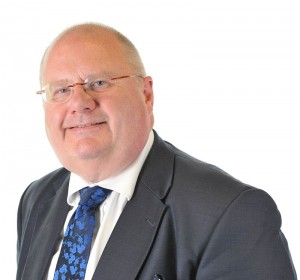Eric Pickles – 2012 Speech at Local Government Summit
Below is the text of the speech made by Eric Pickles, the then Secretary of State for Communities and Local Government, at the Queen Elizabeth II Conference Centre in London on 16 January 2012.
There is no greater responsibility, no higher priority for this Government than to get the nation back on track towards renewed, long-term, sustainable growth.
Growth puts people in jobs, keeps families in homes, makes our towns and cities great places to live.
Getting public spending under control has been vital and non-negotiable.
We’ve strained every sinew to do it in a way that protects the most vulnerable.
Today is Blue Monday – officially the most depressing day of the year, as people look ahead to months of chilly weather and paying back their Christmas bills.
This year, it will be tough for many people – facing pay freezes at work, be it in the public or private sector, as well as a rising cost of living.
This is why it’s essential in February and March, as town hall budgets are set, that councils sign up to the council tax freeze.
It’s practical help every councillor can offer to their ward constituents. A vote against the council tax freeze is a vote for punishing tax-rises. Local taxpayers will remember that decision next time they cast their vote at the ballot box.
Councillors have a moral duty to sign up to keep down the cost of living – anything less is a kick in the teeth to hard-working, decent taxpayers.
But cutting the deficit is only the first step.
We want to give investors confidence to invest.
Make it easy for entrepreneurs to bring their ideas to market.
Make Britain one of the best places in Europe, if not the world, to start and grow and business.
Now in the past, supporting growth might have been seen as a job for the Treasury and Business Department.
But we simply don’t have that luxury today.
This is a job for every part of Government.
Including my Department.
I am determined that the Department for Communities and Local Government should be at the forefront of creating the right conditions for local economies to thrive.
Not least because localism and growth are two sides of the same coin.
Localism and Growth
You can’t engineer, can’t manufacture growth through nationally-dictated plans and blueprints.
However well-meaning, however expertly devised, Regional Development Agencies simply didn’t deliver.
Even in the five years to 2008, before the crunch really bit, the number of private sector jobs fell in Birmingham, in Nottingham, in Sheffield, Bradford, Croydon and Leicester.
Instead of trying to impose growth from Whitehall, we want to encourage and celebrate local leadership, ingenuity, and enterprise.
Instead of the public sector going solo, we want to get councils and entrepreneurs working together.
So we’re creating the conditions for local leadership.
Local Enterprise Partnerships put civic leaders and local entrepreneurs in the driving seat as never before.
Partnerships now host two dozen Enterprise Zones – with tax breaks and simple planning rules to attract new firms.
Partnerships have advised firms bidding for the two point four billion pounds available under Regional Growth Fund – helping safeguard jobs everywhere from steelyards in Redcar, to biotechnology start-ups in Plymouth.
And now we’re reforming business rates, so that councils see a direct benefit to their own finances from boosting the local economy…
…and this will give every council every possible reason to work with businesses and entrepreneurs.
But perhaps the policy that best encapsulates the new approach is the Growing Places Fund.
Half a billion quid is up for grabs for local leaders to support enterprise, encourage businesses, create the conditions for local growth.
What have we asked Local Enterprise Partnerships to do to get their hands on it?
Not complete a form the size of a telephone directory…
Not report every five minutes on every step along the way…
But set out they want to do with the cash, and what they aim to deliver, in terms as simple as we could possibly make them.
It’s a process that is based on our trust in local leaders to deliver.
This means making tough decisions and putting the cash where it can make the biggest difference – not where it’s most expedient, or will appease the most people.
Get this right, vindicate our trust, and this could be the shape of things to come.
Get it wrong, and well – we’re back to the strings and guidelines, the gentle breath of the overseer tickling the hairs on the back of your neck.
Over to You
So the spotlight falls on you.
To a great extent, what happens in your area next is in your hands.
We’ve binned the guidance, the strictures, the blueprints.
As local leaders – whether in business or the Town Hall – for the first time in decades – you’ve got a clear run.
Your communities are looking to you to lead. To shape the future of your local economies.
Now after a little over a year of Local Enterprise Partnerships, there has been good progress.
Coventry and Warwickshire have worked with local banks to unlock finance for start-ups.
Tees Valley Unlimited are working with the UK’s Trade and Investment service to draw in foreign investment.
Places with Enterprise Zones, from Harlow to Hull, are getting on with the necessary to make them a success.
Manchester, for example, have unveiled their detailed plans for Airport City, with the potential to create twenty thousand new jobs, and dozens of firms are already keen to move in.
So on the one hand there’s a huge amount going on.
But on the other there’s absolutely no room for complacency – especially when we can all feel the chill winds blowing from the Continent.
So use today to galvanise your approach.
Some people have said, “we’d love to do our bit but we’d really like some more instruction.”
It’s a play: Waiting for Guidance.
But the best aren’t hanging around.
Look at the West of England.
They’ve not only secured an Enterprise Zone…
They’re also setting up “Enterprise Areas” too, with similar, straightforward planning rules, the better to attract new firms.
They didn’t wait to be told. They thought, “what can we do?” and they did it.
Some have said, “there’s money coming in but it’s going to our neighbours, or the upper tier, or the lower tier.”
Well then – cut a deal.
If you’re going to make the most of localism, you can’t waste time bickering.
The best will join forces.
Some will consider pooling their business rate incomes under the new system…
…sharing the risks and rewards, and helping everyone plan ahead.
If you’re not quite there yet – if you know in your heart of hearts that’s more you could be doing…
Really use today.
Look at your contemporaries in the room.
Learn from each other.
Challenge each other.
If there are people here you don’t know yet – get stuck in.
Who knows if that stranger isn’t the person who can make the links between your universities and business, between your exporters and new markets, between your entrepreneurs and lenders.
Above all, there is no point clinging to the old levers and approaches.
The world has changed.
Nobody’s going to try and force a solution on you.
Nobody’s going to stop you pursuing your own.
Be creative, be ambitious. Do what it takes to create the conditions for your economy to grow.
What it Means
I want to end by thinking about what’s at stake here.
Not too far from my constituency is the Ford plant at Dagenham.
As British engineering faltered towards the end of the last century, it became a symbol of decline.
Of glories past.
The kind of place that motorists snatch in glimpses as they hurtle past on the A13.
Now of course there are still challenges for British automotive industry.
But believe me, it’s on the way back.
In the year to last October…despite the tough conditions…despite the uncertainty in the markets…this country increased exports of vehicles by nearly twenty per cent.
Who’d have dreamt that ten years ago.
Dagenham, meanwhile, now produces a million engines each year, and employs four thousand people.
Creating the conditions for growth is about turning places like Dagenham from symbols of decline, to symbols of hope.
It’s about making space for new industries that give places a sense of purpose.
And about giving the people who look to you a reason to feel proud.
It goes back to why you’re here today.
I doubt very much that anyone gets into public affairs purely for the love of a beautiful spreadsheet, a snappy minute or a well-chaired committee.
We do it because we want to make change happen.
Today, you’ve got a golden opportunity to be the people who create growth, support jobs, underpin the prosperity and quality of life of the communities you work in.
It’s up to you to make the most of it.


